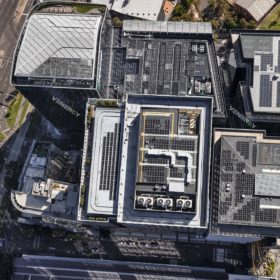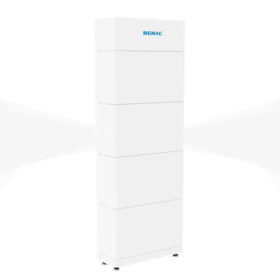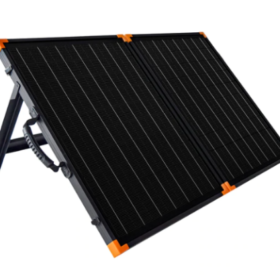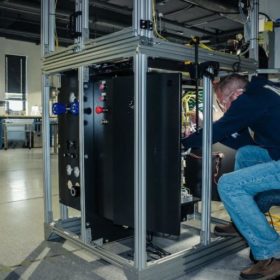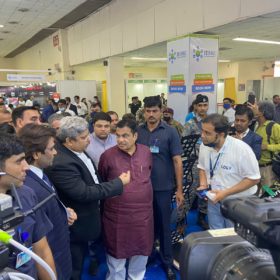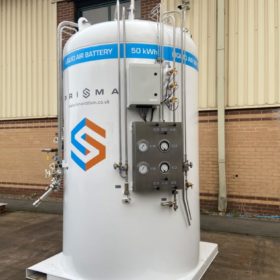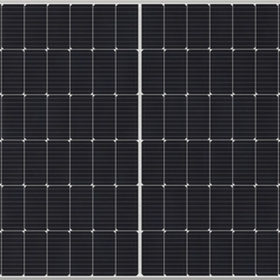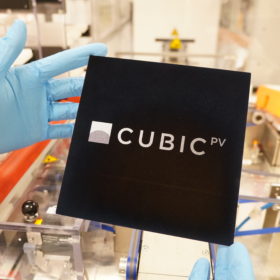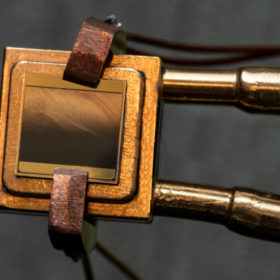The long read: Sky-scraping solar
As people have gradually migrated to the world’s cities, urban areas have migrated upward to scrape the sky. And yet, while one of the first principles of power generation is to generate as close as possible to the point of consumption, energy systems have long been designed to deliver electricity to major cities from distant hubs. But now, thanks to recent advances in solar panel energy density and building-integrated PV, vertical cities could soon be standing tall under their own power.
Renac Power unveils high-voltage residential battery
Renac Power’s new plug-and-play battery has a storage capacity of 3.74 kWh, but it can be enhanced in series with up to five batteries to 18.7 kWh. It has a nominal voltage of 96 V and a voltage range of 81 V to 108 V.
Solar briefcase packs in 200 W for off-grid, mobile living
FlexSolar has developed a foldable, portable PV briefcase kit with a charge controller and connection cables.
US startup claims hydrogen output for $0.85/kg or less via new water vapor electrolyzer
Advanced Ionics has developed an electrolyzer that runs at temperatures below 650 C. It is reportedly able to produce hydrogen for $0.85/kg or less. CEO Chad Mason recently spoke with pv magazine to provide a closer look at the water vapor electrolysis tech.
Transport minister calls for needs-based research on battery storage
India should focus on developing and manufacturing battery storage chemistries that are locally suitable in terms of economic, environmental and social considerations, Minister of Road Transport Nitin Gadkari said at India Energy Storage Week 2022 in New Delhi.
UK group develops liquid air energy storage tech
A UK consortium has developed the Prisma system, which stores thermal energy in liquid air form to provide onsite compressed air, via a latent energy cold storage tank filled with a phase-change material. It is expected to have a levelized cost of storage of GBP 114 ($143.10)/MWh.
Sharp launches 540 W bifacial solar module
Sharp’s new IEC 61215 and IEC 61730-certified-certified panel features 144 half-cells based on M10 wafers and a 10-busbar design. Its operating temperature coefficient is -0.349% per degree Celsius and its power tolerance reaches up to 5%.
CubicPV, Waaree sign five-year deal for annual solar cell supply of 1 GW
USA-headquartered CubicPV will supply, per annum, 1 GW of Direct Wafer silicon solar cells to Indian manufacturer Waaree Energies under a five-year contract. The cells will be supplied from its upcoming 2 GW factory in India.
MIT, NREL researchers develop 40%-efficient thermophotovoltaic cell for grid-scale thermal batteries
The device is described as a heat engine with no moving parts that is able to produce power from a heat source of between 1,900 to 2,400 C. This concept is known as thermal energy grid storage (TEGS) and consists of a low-cost, grid-scale storage technology that uses thermophotovoltaic cells to convert heat to electricity above 2,000 C.
Transforming the energy storage market
Ensuring pragmatic energy storage transformation is proportional to tweaking the current battery storage chemistry. Zinc battery technology is gaining traction, changing the prevailing energy storage dynamics.
